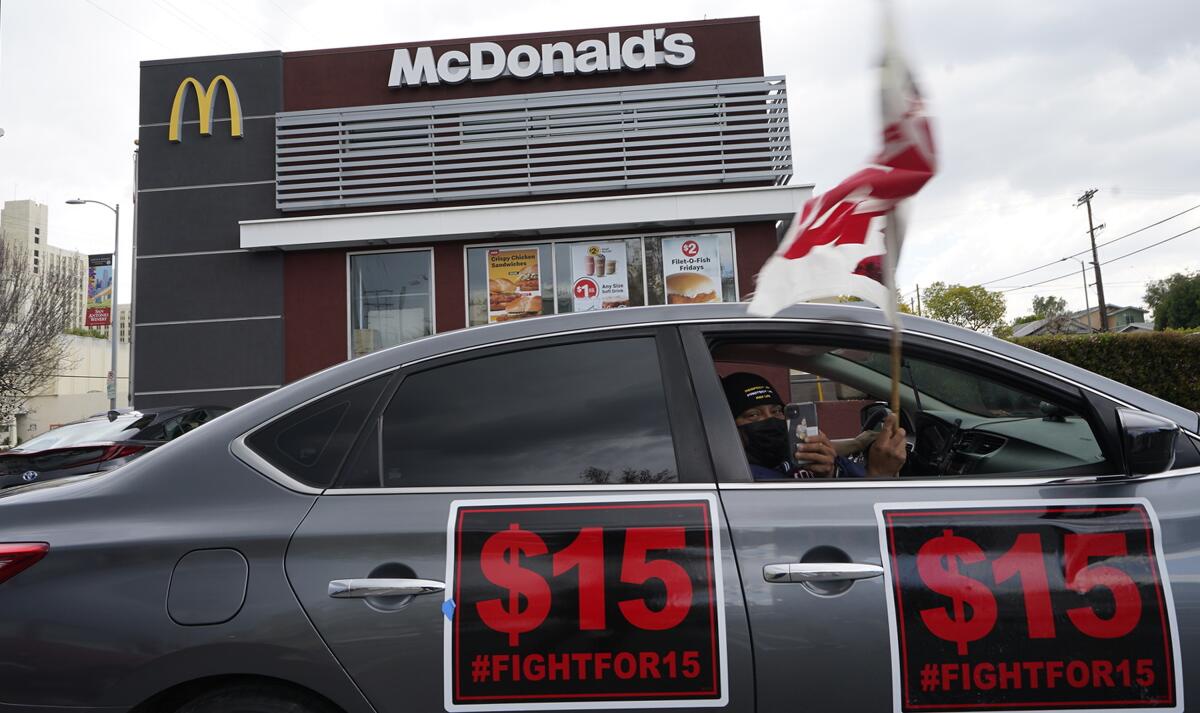Low wages, short hours drive many fast-food workers into homelessness

- Share via
When Jose de la Torre began delivering pizzas for Papa Johns in 2019, he made $15 an hour and shared a one-bedroom apartment in the Florence-Graham neighborhood with half a dozen other people.
After two years on the job, his hourly rate was the same but his work schedule had been cut — to about 30 hours a week instead of the full 40, he said. Meanwhile, his everyday living expenses had gone up. He began sleeping in his Nissan Altima, parking it near the Papa Johns in Lynwood where he worked.
“I made the choice,” De la Torre, 53, said. “It was either my car and eat, or rent.”
De la Torre’s situation is not uncommon among current and recent fast-food workers, who make up 11% of all homeless workers in California and 9% in Los Angeles County, according to a report released Tuesday by Economic Roundtable. The nonprofit research organization estimated that there are 10,120 fast-food workers in California who are homeless.
Of the total homeless population, the group estimated that people who have worked fast-food jobs in the last 12 months make up 5.9% in California and 5.2% in L.A. County. It said the median annual earnings of frontline fast-food workers — such as cooks, cashiers, food prep workers and dishwashers — was $14,949 statewide in 2020.
California voters complain that canvassers for a measure to repeal a law expanding protections for fast-food workers lied about the effects.
“The fast-food industry is a poverty employer, with a larger share of its workers in poverty than any other industry,” said the report, which was underwritten by the Service Employees International Union. “Raising the wage floor in this industry is the single most important step for reducing economic homelessness in the state.”
California is now home to more than 171,000 homeless individuals, according to the U.S. Department of Housing and Urban Development, a 6.2% increase since 2020.
The average hourly wage of fast-food and counter workers in California was $16.60 last year, according to the U.S. Bureau of Labor Statistics.
In addition to low wages, fast-food workers are hamstrung by part-time hours and unpredictable on-demand scheduling, the Economic Roundtable report said. Combined, that can create and perpetuate poverty and undercut workers’ ability to pay rent. A sudden change in employment or a large unavoidable expense can quickly push a worker into homelessness.
The nonprofit examined industrywide data from restaurant chains including McDonald’s, Starbucks, Burger King, Jack in the Box and Yum Brands (the parent of KFC, Taco Bell and Pizza Hut).
The fast-food industry benefits everyone but the workers, said Daniel Flaming, president of Economic Roundtable. Customers get cheap and efficient meals while the fast-food brands, which flourished during the pandemic, make billions of dollars annually.
“The profits are on the backs of workers who can’t keep their heads above water,” Flaming said. “The entire playing field needs to be raised.”
Founded in 1991, L.A.-based Economic Roundtable conducts research on environmental sustainability, affordable housing, employment and social equity. Flaming said the nonprofit received $35,000 from the SEIU to conduct the homelessness study and an additional $15,000 donation from the union.
Economic Roundtable’s findings were heavily criticized by the International Franchise Assn. The trade group, which represents franchise brands and their franchisees, said the SEIU was using the findings “to advocate for its union growth agenda.”
“This report is not a scientific study, but an advocacy piece with zero credibility because the numbers were manipulated,” Jeff Hanscom, vice president of state and local government relations for the association, said in a statement Tuesday. He said authors appeared to have overcounted the number of homeless fast-food workers in the state by using methodology that failed to exclude some employees of full-service restaurants and unemployed people who had earned as little as $400 in income from fast-food jobs in the last year.
Flaming said it was necessary to include former workers who were currently unemployed in the sample because “one of the attributes of this industry is it churns workers.” He added, “I would welcome transparency on their part to put forward into the public credible, verifiable information about their labor force.”
De la Torre is still homeless today, a situation unlikely to change in the near future after he lost his job in March when the Papa Johns branch abruptly closed.
Gov. Gavin Newsom on Monday signed a nation-leading measure giving more than a half million fast-food workers in California more power and protections, despite the objections of restaurant owners who warned it would drive up consumers’ costs.
On Monday, Papa Johns said the Lynwood location had been owned and operated by a franchisee and that the Atlanta company “does not control or dictate independent franchisees’ employment activities, including hiring, termination and compensation.”
“As a company, Papa Johns believes that all of its team members should be fairly compensated with market competitive rates and in accordance with the law,” Papa Johns said in a statement. “We continue to expand benefits and our compensation plans.”
De la Torre said he is considering becoming a delivery driver for Uber Eats but hasn’t figured out a game plan yet. His hope is to be able to find a home again soon so his children know where he is and can come visit.
“It makes me really emotional because this is something that has never happened to me,” he said. “It’s a scary situation.”
- Share via
Watch L.A. Times Today at 7 p.m. on Spectrum News 1 on Channel 1 or live stream on the Spectrum News App. Palos Verdes Peninsula and Orange County viewers can watch on Cox Systems on channel 99.
More to Read
Updates
2:12 p.m. May 2, 2023: This article has been updated to include a response from the International Franchise Assn. and to clarify that the methodology used in the report included people who had worked fast-food jobs within the past 12 months.
Inside the business of entertainment
The Wide Shot brings you news, analysis and insights on everything from streaming wars to production — and what it all means for the future.
You may occasionally receive promotional content from the Los Angeles Times.














